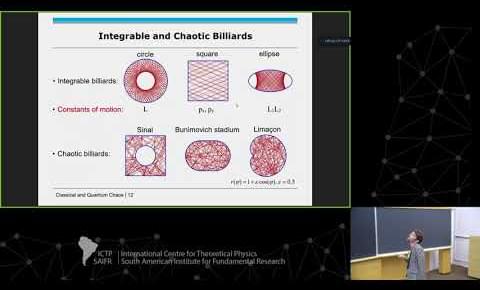Quantum chaos focuses on the quantum manifestations of classical chaos. A characteristic of classical chaos is the exponential sensitivity of the dynamics with respect to infinitesimal changes in the initial conditions. Thus, to classify classical dynamics it is sufficient to follow phase space trajectories starting infinitesimally close to each other and to determine the evolution of their distances with respect to each other with time. Because of the uncertainty relation, this is no longer possible in the corresponding quantum system. One important aspect of quantum chaos is the understanding of features of the classical dynamics in terms of the fluctuation properties in the energy spectra of closed quantum systems or of the fluctuations exhibited by the scattering matrix elements describing open ones. The fluctuation properties are predicted to be universal, that is, to be the same for systems belonging to the same universality class and exhibiting the same chaotic behavior in the corresponding classical dynamics and to be describable by random matrix theory. Furthermore, random-matrix models that had been developed for the scattering matrix associated with compound-nuclear reactions have been shown to be applicable to quantum-chaotic scattering processes. A second important aspect within the field of quantum chaos concerns the semiclassical approach. In this context, one of the most important achievements was the periodic orbit theory pioneered by Gutzwiller, which led to understanding the impact of the classical dynamics on the properties of the quantum system in terms of purely classical quantities. The focus of research within the field of quantum chaos has been extended to relativistic quantum systems and to many-body quantum systems with focus on random matrix theory and the semiclassical approach. In distinction to single-particle systems, many-body systems like atomic nuclei do not have a classical analogue. In recent years different measures of chaos and models have been developed. Here, a prominent model is the Sachdev-Ye-Kitaev model which serves as a paradigm for the study of quantum chaos in strongly interacting many-body systems. The school is aimed at PhD students, post-docs and outstanding master students and the first part will provide a survey of single-and many-body quantum chaos and applications based on random-matrix theory and the semiclassical approach. The second part of the school will focus on current aspects of research in the context of many-body quantum chaos. There is no registration fee and limited funds are available for travel and local expenses. Organizers: Hilda Cerdeira (IFT-UNESP, Brazil) Barbara Dietz-Pilatus (Institute for Basic Science (IBS), Republic of Korea)










Leave a reply